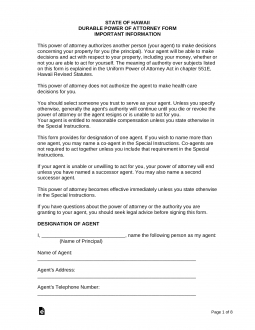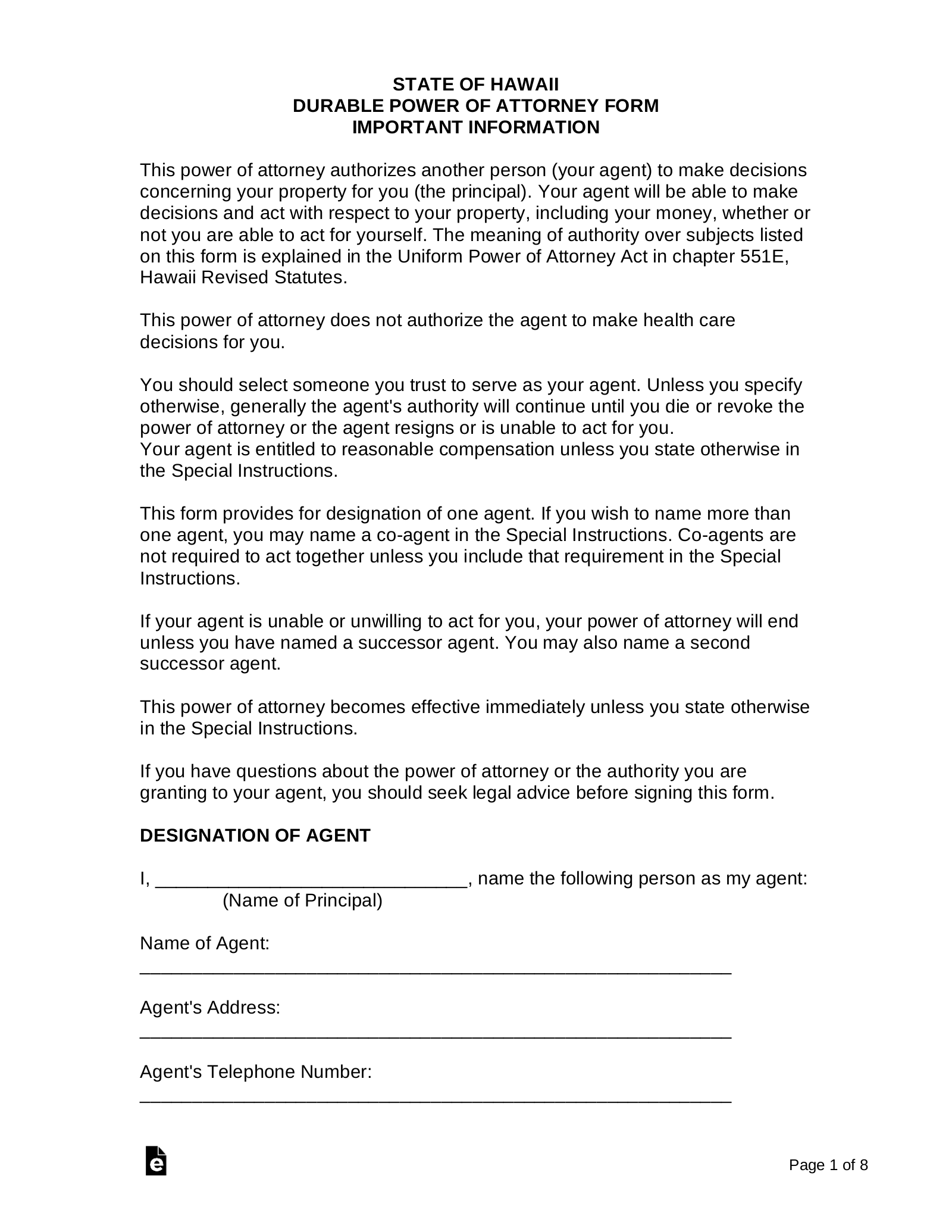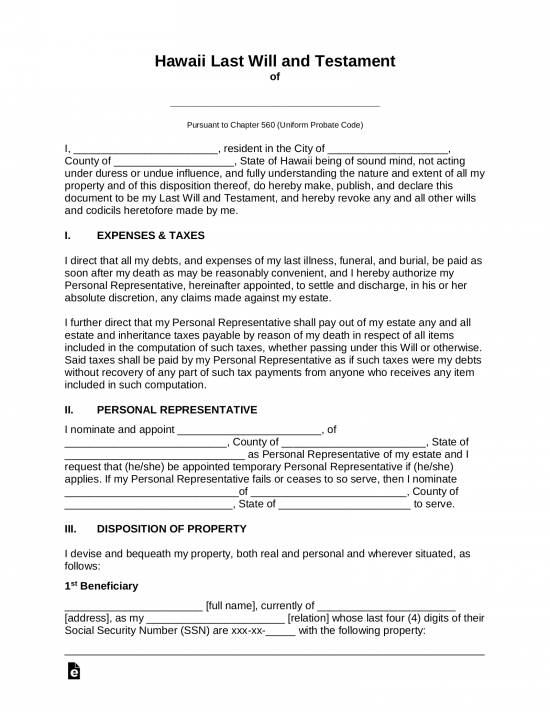Updated August 08, 2023
A Hawaii durable power of attorney form can be used to grant authority to another person expected to handle financial affairs, property, and assets. It is read the form carefully to make sure the powers that are being given to the agent. It is important that the agent appointed someone that can be trusted. The agent will be required to always act in the principal’s best interest. This type of power of attorney is referred to as “durable” because it continues even if the principal becomes unable to make decisions for themselves (“incapacitated”).
Table of Contents |
Laws
Title 30, Section 551E (Uniform Power of Attorney Act)
Definition of “Durable”
“Durable” means not terminated by the principal’s incapacity, with respect to a power of attorney (§551E-1).
Definition of “Power of Attorney”
“Power of attorney” means a writing or other record that grants authority to an agent to act in the place of the principal, whether or not the term “power of attorney” is used (§551E-1).
Signing Requirements
The principal is required to authorize their signature in the presence of a notary public. For an extra layer of certification, the agent may also complete the optional Agent Certification with their signature acknowledged in front of a notary public (§ 551E-3(b), § 551E-52).
Statutory Form
The Hawaii Revised Statutes contain a sample statutory form for a durable power of attorney at § 551E‑51.
How to Write
Download: PDF, MS Word, OpenDocument
Designation Of Agent
(1) Name Of Principal. This grant of principal power must be attached properly to the Hawaii Principal issuing it. This is the person who will use this document to appoint an Agent with the authority to represent him or her. Present the full name of the Hawaii Principal issuing this document.
(2) Name Of Agent. The Hawaii Attorney-in-Fact or Agent who will represent the Principal in the matters this document approves mut be named as well. Thus, record the full name of the Hawaii Attorney-in-Fact. There will be additional areas where the Hawaii Attorney-in-Fact’s contact information should also be dispensed.
(3) Agent’s Address.
(4) Agent’s Telephone Number.
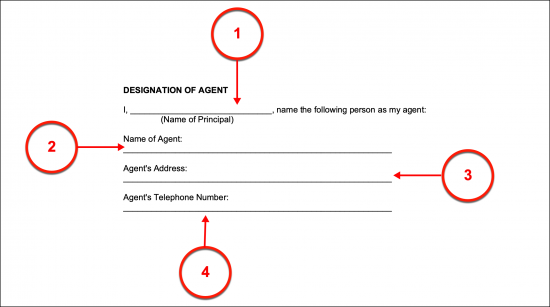
Name Of Successor Agent(s)
(5) Name Of Successor Agent. An optional designation enabled by this paperwork is for a Successor Agent. This can be a useful cost-saving measure. For instance, if the Hawaii Attorney-in-Fact cannot or will not act for the Principal when expected to handle time-sensitive matters, this may have serious repercussions to the Hawaii Principal’s finances. To safeguard against such a scenario, a Successor Agent who can take over this role when it becomes vacant and accept the authority and responsibility of acting in the Hawaii Principal’s name can be appointed. Take advantage of this option by documenting the full name of the Party who should take up this role when the original Attorney-in-Fact is ineffective.
(6) Successor Agent’s Address.
(7) Successor Agent’s Telephone Number.
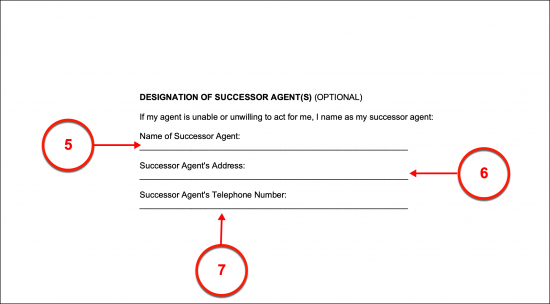
(8) Name Of Second Successor Agent. There are quite a few scenarios where both the Hawaii Attorney-in-Fact and First Successor Agent are unreachable, refuse their designation, have been revoked without a replacement set in place, or cannot otherwise fill the Hawaii Attorney-in-Fact position. If the Principal wishes, a Second Successor Agent can be established to assume this role by documenting his or her full name where requested. After naming the Second Successor Agent, make sure that his or her contact information is displayed.
(9) Second Successor Agent’s Address.
(10) Second Successor Agent’s Telephone NumberGrant Of General Authority.
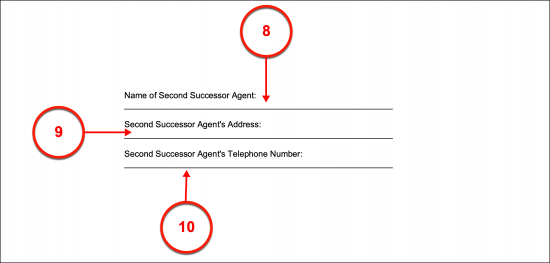
(11) Required Principal Approval. A list of the types of authority that can be granted through this document is on display for the Hawaii Principal’s review and approval. Only he or she can initial the items on this list to grant the Attorney-in-Fact the power to act in that subject matter. If an item is not initialed by the Hawaii Attorney-in-Fact, then it will not be included in the Attorney-in-Fact’s granted principal powers. For example, by initialing items such as “Real Property” and “Tangible Personal Property” the Hawaii Principal will authorize the Attorney-in-Fact to perform actions such as selling, managing, obtaining, or altering the Principal’s real estate properties and his or her personal property. If the Hawaii Principal initials these items as well as, “Banks And Other Financial Institutions, then the Attorney-in-Fact will not only be able to represent the Principal’s actions with a property but can also act as the Principal to manage his or her bank accounts. The Hawaii Principal should review this list then initial (only) each topic that he or she wishes the Attorney-in-Fact to handle on his or her name. Be advised that if the Hawaii Principal intends to grant all these principal powers to the Attorney-in-Fact then, this list may be left blank and only the final item “All Preceding Subjects” should bear the Hawaii Principal’s initialed.
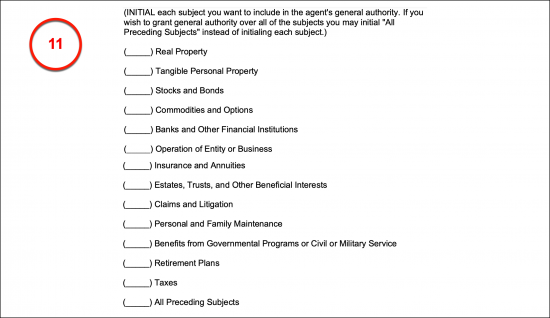
Grant Of Specific Authority
(12) Inter Vivos Trust. If the Hawaii Principal intends for his or her Attorney-in-Fact to engage the same decision-making powers with trusts that he or she manages or has issued, then specific authority for this power must be granted. The Hawaii Principal’s initials are the only instrument that can grant this power once they are presented to approve the first specific power that can be granted to the Attorney-in-Fact.
(13) Make A Gift. The second specific power that will require approval if the Principal wishes to designate it to the Hawaii Attorney-in-Fact is to make gifts in the Principal’s name. Be advised, this can include debt forgiveness as well as donations. To grant this ability to his or her Attorney-in-Fact, the Hawaii Principal must initial the appropriate statement.
(14) Rights Of Survivorship. The ability to create any rights of survivorship or to change them can be granted to the Attorney-in-Fact through the Principal’s initials to this section. This is true even, if the Attorney-in-Fact has been granted such general powers as that over the Principal’s estate. Thus, if the Hawaii Principal wishes the Attorney-in-Fact to create rights of survivorship or amend ones already set in place then the third specific power must be initialed by the Hawaii Principal.
(15) Beneficiary Designation. To authorize the Attorney-in-Fact’s principal power to create new beneficiary designations for the Principal or change existing ones then the fourth statement of this section must bear the Hawaii Principal’s initials.
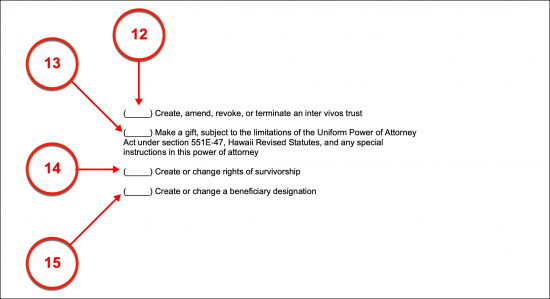
(16) Power Of Delegation. The Hawaii Principal can allow the Attorney-in-Fact to delegate the power(s) granted in this document to a Third Party. If the Attorney-in-Fact will be expected to carry out this directive, then the fifth specific power statement should be initialed by the Hawaii Principal.
(17) Waiving Beneficiary Rights. The sixth specific power statement appoints the Hawaii Attorney-in-Fact with the principal authority to waive beneficiary rights the Principal is entitled to (ranging from joint and survivor annuity to the survivor benefits awarded under retirement plans).
(18) Fiduciary Powers. If the Hawaii Principal has been granted fiduciary powers to act on a Third Party’s behalf and wishes to enable his or her Attorney-in-Fact to engage these same powers and carry out these same responsibilities, then the final statement must be initialed to authorization by the Hawaii Principal.
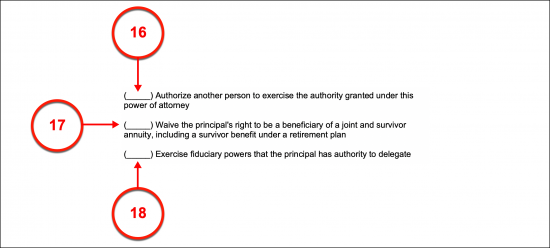
Special Instructions
(19) Hawaii Principal Instructions. This appointment has provided the standard language needed for the appointment of principal authority the Hawaii Principal wishes made. If he or she has additional instructions to the granted authority, intends to limit or expand these abilities, set a specific start date, and/or set a predefined termination date, then all such information should be included. Document all Hawaii Principal directives to the space provided.

Nomination Of Conservator Or Guardian
(20) Conservator Nominee Information. Hawaii State Courts may determine that a Conservator of your estate or a Guardian should be formally appointed when you are unable to make decisions or incapacitated for a significant period of time. The decision on who to appoint is purely in the power of the Hawaii State Court deliberating on the matter however, the Principal’s nomination for either of these positions is usually taken into consideration. Use the first area provided to name nominate either a Conservator or a Guardian for court appointment.
(21) Conservator Nominee Information. After supplying the name of the Hawaii Principal’s Conservator or Nominee’s name, produce his or her contact information.
(22) Guardian Nominee. If the Hawaii Principal also has a nomination in mind for Court-Appointed Guardian, then present the name and contact information of this Nominee to the final area.
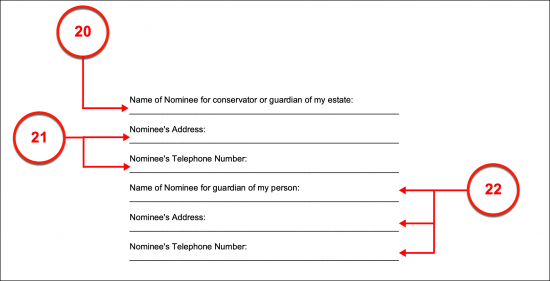
Reliance On This Power Of Attorney
(23) Your Signature And Signature Date. This form requires that the Hawaii Principal provide a valid signature after its completion to make it effective. His or her signature should be produced in front of a Notary Public.
(24) Your Name Printed. The full name of the Hawaii Principal must be recorded so that it appears exactly how it was presented earlier in this paperwork.
(25) Your Address. Space has been provided for the Hawaii Principal to report his or her mailing address and contact telephone number.
(26) Your Telephone Number.
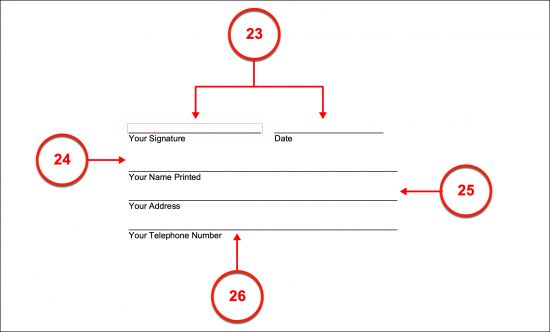
(27) Notarization. After the Hawaii Principal has signed this document, the Notary Public watching must provide a few items to complete the notarization process. Once done, he or she will return this paperwork with the newly notarized signature.
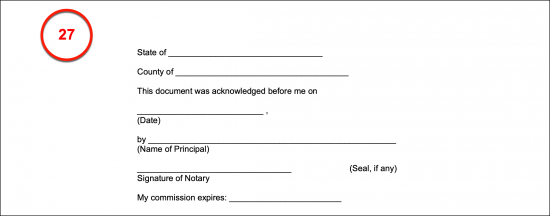
Preparer Report
(28) Identity Of Document Preparer. The full name, complete address, and telephone number of this document’s Preparer should be disclosed. The Preparer is a Party who has physically entered information into this paperwork (i.e. typing in the name of the Parties involved).

Agent’s Certification As To The Validity Of Power Of Attorney
(29) Signature Location. The Hawaii Health Care Agent appointed is expected to document a formal acknowledgment of the authority and responsibilities the Principal designates to him or her. This process requires a record of the state and county where the Hawaii Health Care Agent provides his or her signature acknowledgment. This requirement may need to be fulfilled by the Notary Public in attendance depending on the instructions he or she is providing for the notarization process.
(30) Name Of Agent. The statement provided requires that the full name of the Hawaii Health Care Agent be presented.
(31) Name Of Principal. In addition to identifying the Health Care Agent’s name, the Hawaii Principal must be named in this declaration.
(32) Power Document Date. The Hawaii Principal’s signature date must be reproduced in this declaration of acceptance.
(33) Attorney-in-Fact Comments. Any relevant observations or comments the Hawaii Health Care Agent wishes documented should be included to this statement before it is signed.
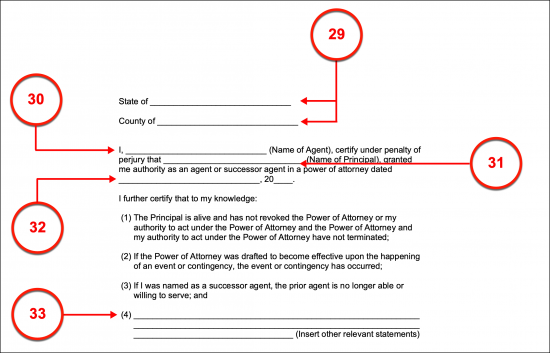
Signature And Acknowledgment
(34) Hawaii Health Care Agent’s Signature. The Hawaii Health Care Agent or Medical Attorney-in-Fact must sign this statement before a Notary Public so that it may be considered an effective acknowledgment.
(35) Hawaii Health Care Agent’s Date Of Signature.
(36) Agent’s Name Printed.
(37) Agent’s Address. The Hawaii Health Care Agent’s permanent address must be documented.
(38) Telephone Number Of Hawaii Health Care Agent.
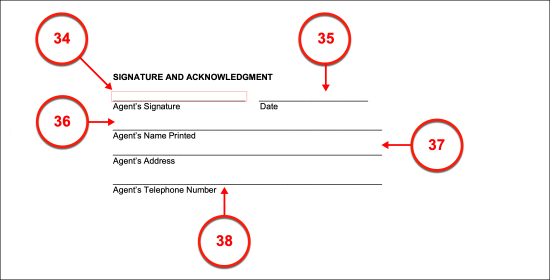
(39) Agent Signature Notarization. The Notary Public overseeing the Hawaii Health Care Agent or Medical Attorney-in-Fact’s signing will complete the notarization process once the requirements he or she has put forth have been satisfied.
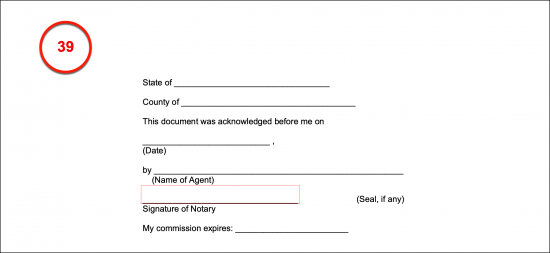
Hawaii Health Care Agent Statement Preparer
(40) Preparer Identity. If the information presented to the Hawaii Health Care Agent’s statement was supplied by a Preparer then the Preparer is expected to self-report by disclosing his or her name and contact information to the space provided.

Related Forms
Download: PDF
Download: PDF

